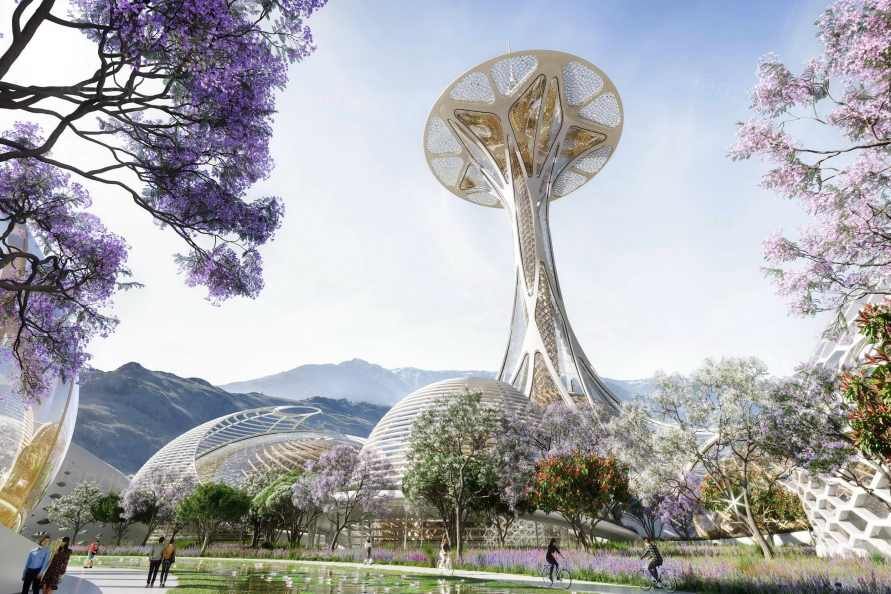木材建造的仿生植物温室建筑群
生态是21世纪建筑的 "原材料",这也是授粉者公园的主题,颂歌自然。项目的有机设计直接从植物的有性繁殖方式授粉中获得生物灵感。因此,它的结构从一朵盛开的花中获得了诗意的灵感。
An architectural cluster of biomimetic botanical greenhouses built with mass timber and positive energy
Ecology is the “raw material” of architecture in the 21st century and this is the leitmotif of Pollinator Park. Ode to nature, its organic design is directly bioinspired by pollination, the sexual reproduction method of plants. It thus poetically draws its structure from that of a blooming flower.
▼视频 Video
中央公园象征着雌性植物的繁殖器官,并将公园的所有展览空间统一起来。从下到上,子房构成了教育性的螺旋结构生物穹顶,风格上容纳了全景玻璃电梯和步梯,而柱头则变成了一个在天空中的观景台。
Central Park symbolizes female organs and unites all of the park's exhibition spaces. From bottom to top, the ovaries constitute the educational spiral-structured biodomes, the style accommodates a panoramic glass elevator and a Chambord double staircase, while the stigma is transformed into an observation platform flourishing in the sky.


从这个思想出发,项目在空间上呈放射状排列,它们的条纹和丰满的几何形状是受花药的启发,花药是花朵的雄性器官,上面覆盖着花粉颗粒。
From this epicenter, the Farmlands - biodomes with honeycomb structures, ribbed leaves, or even voronoi - are dedicated to the agriculture of the future. They are spatially organized in a radial plane. Their striated and voluptuous geometries are inspired by anthers, the male organs of a flower covered with pollen grains.

在景观方面,这些用于展览和农业生产的植物温室被一个巨大的花被保护起来。这包括中央公园周围的5个花萼和农田周围的5个花瓣花冠。
In terms of landscape, these botanical greenhouses for exhibition and agricultural production are protected by a huge perianth. This consists of a 5-sepal calyx around Central Park and a 5-petal corolla around the Farmlands.

授粉者公园的有机建筑激发了游客体验的自然流动,生物形态的建筑和郁郁葱葱的自然融合成一个独特的生态系统。花粉酒店也在自然环境中融入了建筑群,因为花粉公园首先是它们的家!
The organic architecture of Pollinator Park stimulates the natural flow of the visitor experience where biomorphic architecture and lush nature merge into a unique ecosystem exhibiting how nature creates ecosystems. In each environment, pollinator hotels are integrated into the playful architecture because Pollinator Park is, first and foremost, their home!

为了达到循环经济和可再生能源的需要,所有的温室都是由交叉层压木材(CLT)和回收或可回收的生物源材料以良性循环和短路方式分布的轻型框架设计而成。
Ode to the circular economy and renewable energies, all greenhouses are designed from light frames in cross-laminated timber (CLT) and recycled or recyclable biosourced materials distributed in virtuous loops and short circuits.

大规模的木质生物穹顶覆盖着太阳能板,产生的能量甚至比消耗的更多,同时,太阳能板可以过滤太阳光,并在光和影之间创造一个完美的平衡。
The mass timber biodomes are covered with photovoltaic and thermal solar shields in order to become positive energy buildings producing more energy than they consume. These sun shields filter the sun's rays and create a perfect balance between light and shadow.

为了创造这种积极的平衡,一个风力烟囱和风力涡轮机的领域被径向植入景观中。这个风力发电场还可以利用风的能量,并利用地面的热惯性,使温室内的空间自然地进行生物调控,利用地热能在夏季为温室降温,冬季为温室供暖,地面温度常年保持在18摄氏度。
In order to create this positive balance, a field of wind chimneys and wind turbines is radially implanted in the landscape. This wind farm also makes it possible to use the energy of the wind and take advantage of the ground's thermal inertia to naturally bioclimatize the spaces inside the greenhouses. In fact, the wind chimneys use geothermal energy to cool the greenhouses in summer and heat them in winter, the temperature of the ground resting at 18 degrees Celsius all year round.

因此,在建筑和能源方面,是生态工程的典范项目。在这个仿生绿洲中,灵感来自于自然生态系统的形状、结构,景观体验的重点是授粉者和食物生产之间的相关性。这种身临其境的场景设计旨在让欧洲人,无论老少,都能感受到诗意的感动,更好地教导他们如何保护他们的自然动植物遗产,进而保护他们的健康。
In terms of construction and energy, Pollinator Park is therefore a real carbon sink and an exemplary project in terms of ecological engineering. Within this biomimetic oasis inspired by the shapes, structures, and feedback loops of natural ecosystems, the scenographic experience focuses on the correlation between pollinators and food production. This immersive scenography aims to sensitize and poetically move Europeans, young and old, to better teach them how to protect their natural fauna and flora heritage and consequently their health.


Project: The European Commission'S Pollinator Park
Client: European Commission, Brussels
Eu Commissioner Environment: Virginijus Sinkevicius
Architect: Vincent Callebaut Architectures, Paris
Partners: Royal Belgian Institute Of Natural Sciences, Museu De Ciencies Naturals Of Barcelona, Naturalis Biodiversity Center Of Leiden
Story & Technology: Poppins & Wayne
Virtual Reality: Cousteau Studio
Performing: "Dead Beez" By Stiin Cole
|